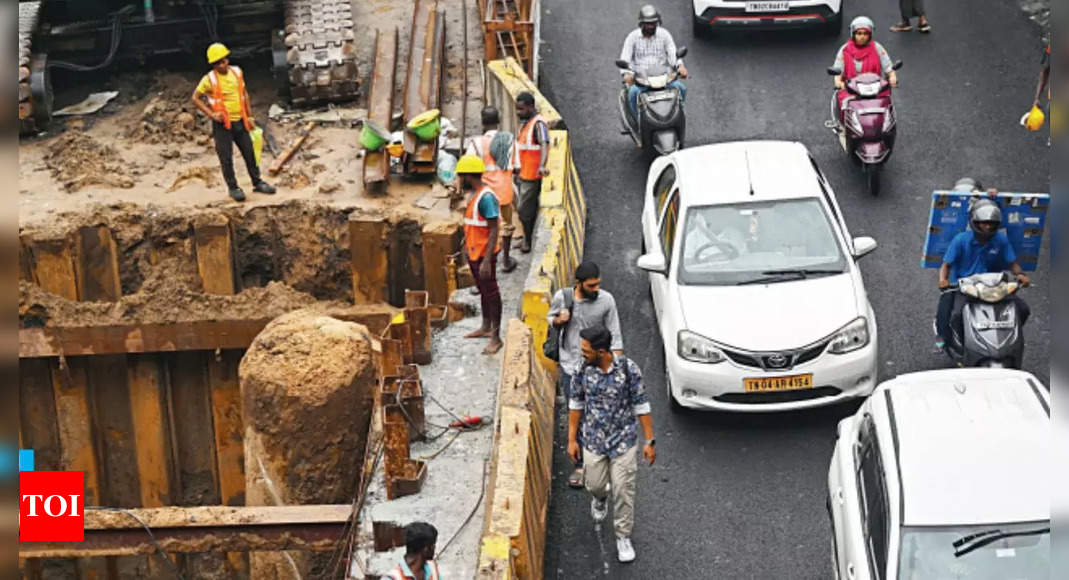New Delhi: When the Master Plan of Delhi 2041 will be notified is anyone’s guess. Despite concerns voiced by stakeholders and several demands made by community groups, the master plan, which proposes and regulates organised and structured development of the capital, is yet to be implemented.
The draft plan is currently with central govt. The Union housing and urban affairs ministry, in a written reply in the Rajya Sabha recently, said MPD41 contained complex matters requiring thorough analysis and stakeholder consultations. These were under progress, it said. LG VK Saxena approved MPD41 on Feb 28 last year. The highlights of the plan are inclusive development, environmental sustainability, a green economy, infrastructure development to create sufficient housing for all sections of society and innovative interventions like transit-oriented development hubs.
In the absence of MPD41’s implementation, citizens and specialists have expressed worry at the increasing illegal constructions and disorder on the city’s outskirts arising from the non-operation of crucial policies such as green development and land pooling. In fact, some villages have sat in protest at the delay while others have submitted petitions to the central ministry.
The green development policy is meant to carry out planned changes in 88 rural areas, divided into zones, on the borders of the city. The resident villagers, however, argue that unless an amendment proposed in Delhi Development Act, 1957 is passed in Parliament and MPD41 is notified, the policy can’t be effectively implemented. “Though the GDA policy was passed in 2013, its regulations were kept on hold pending resolution of objections. Later, a new policy was introduced,” said Bhupinder Bazad, president, Master Plan Committee, Delhi Dehat Vikas Manch. “Now the policy has been incorporated into MPD41 and so needs the approval of urban affairs ministry.”
Delhi Dehat Vikas Manch held a protest at Jantar Mantar on the issue on Sunday. “Along with implementing the policy, circle rate and other revenue issues should be resolved,” Karan Singh, president, Kanjhawala Dharma Committee.
Under the land pooling policy, which has been in operation since 2018, 20,640 hectares have been identified in 105 villages as poolable. The policy requires 70% contiguous land for the formation of a consortium, which then facilitates infrastructural developments.
The implementation has faced operational impediments, to overcome which amendments to Delhi Development Act have been proposed. “These amendments allow plotted development, increased FAR and provide flexibility even if the 70% contiguity requirement is not met,” said Bazad. The amendments can empower the Centre to mandatorily pool the land even if the minimum requirements aren’t met.
Surendra Solanki, pradhan of the Palam 360 Khap Panchayat, said the association had held meetings with the Union urban affairs minister and LG on the two policies. “We want the amendments proposed by the villagers to be incorporated in the policies. If no concrete steps are taken to implement these policies soon, we might abstain from participating in the coming assembly elections,” he warned.
Jagan Shah, an expert on urban policy, fel said: “The draft plan proposed a clear policy on the green belt of Delhi, which comprises urban villages in which unauthorised construction and wanton commercialisation had severely impacted the quality of life. Such haphazard growth compounds the pressures on land and infrastructure while also creating adverse environmental externalities.”
Apart from MPD 1961, the first master plan, subsequent plans had failed to achieve their objectives, pointed out Sabyasachi Das, former DDA planning commissioner. He said, “MPD21 was implemented seven years after the due time limit because writing ‘development jargon’ was easier than implementing policies on the ground. There were so many difficulties faced in implementing MPD21 because concepts like ‘mixed land use’ proved disastrous. There was commercialisation everywhere.”




